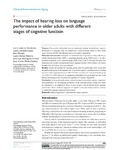Mostrar o rexistro simple do ítem
The impact of hearing loss on language performance in older adults with different stages of cognitive function
| dc.contributor.author | Lodeiro-Fernández, Leire | |
| dc.contributor.author | Lorenzo-López, Laura | |
| dc.contributor.author | Maseda, Ana | |
| dc.contributor.author | Núñez-Naveira, Laura | |
| dc.contributor.author | Rodríguez-Villamil, José Luis | |
| dc.contributor.author | Millán-Calenti, José Carlos | |
| dc.date.accessioned | 2015-11-20T12:05:23Z | |
| dc.date.available | 2015-11-20T12:05:23Z | |
| dc.date.issued | 2015-04-09 | |
| dc.identifier.citation | Lodeiro-Fernández L, Lorenzo-López L, Maseda A, Núñez-Naveira L, Rodríguez-Villamil JL, Millán-Calenti JC. The impact of hearing loss on language performance in older adults with different stages of cognitive function. Clin Interventions Aging. 2015;10:695-702 | es_ES |
| dc.identifier.uri | http://hdl.handle.net/2183/15578 | |
| dc.description.abstract | [Abstract] Purpose. The possible relationship between audiometric hearing thresholds and cognitive performance on language tests was analyzed in a cross-sectional cohort of older adults aged ≥65 years (N=98) with different degrees of cognitive impairment. Materials and methods. Participants were distributed into two groups according to Reisberg’s Global Deterioration Scale (GDS): a normal/predementia group (GDS scores 1–3) and a moderate/moderately severe dementia group (GDS scores 4 and 5). Hearing loss (pure-tone audiometry) and receptive and production-based language function (Verbal Fluency Test, Boston Naming Test, and Token Test) were assessed. Results. Results showed that the dementia group achieved significantly lower scores than the predementia group in all language tests. A moderate negative correlation between hearing loss and verbal comprehension (r=−0.298; P<0.003) was observed in the predementia group (r=−0.363; P<0.007). However, no significant relationship between hearing loss and verbal fluency and naming scores was observed, regardless of cognitive impairment. Conclusion. In the predementia group, reduced hearing level partially explains comprehension performance but not language production. In the dementia group, hearing loss cannot be considered as an explanatory factor of poor receptive and production-based language performance. These results are suggestive of cognitive rather than simply auditory problems to explain the language impairment in the elderly. | es_ES |
| dc.language.iso | eng | es_ES |
| dc.publisher | Dove Press | es_ES |
| dc.relation.uri | http://dx.doi.org/10.2147/CIA.S81260 | es_ES |
| dc.rights | Creative Commons Licence | es_ES |
| dc.rights | Reconocimiento-NoComercial 4.0 Internacional | |
| dc.rights.uri | http://creativecommons.org/licenses/by-nc/4.0/ | |
| dc.subject | Auditory impairment | es_ES |
| dc.subject | Verbal function | es_ES |
| dc.subject | Aging | es_ES |
| dc.subject | Cognition | es_ES |
| dc.title | The impact of hearing loss on language performance in older adults with different stages of cognitive function | es_ES |
| dc.type | info:eu-repo/semantics/article | es_ES |
| dc.rights.access | info:eu-repo/semantics/openAccess | es_ES |
Ficheiros no ítem
Este ítem aparece na(s) seguinte(s) colección(s)
-
GI-GIGG - Artigos [111]






